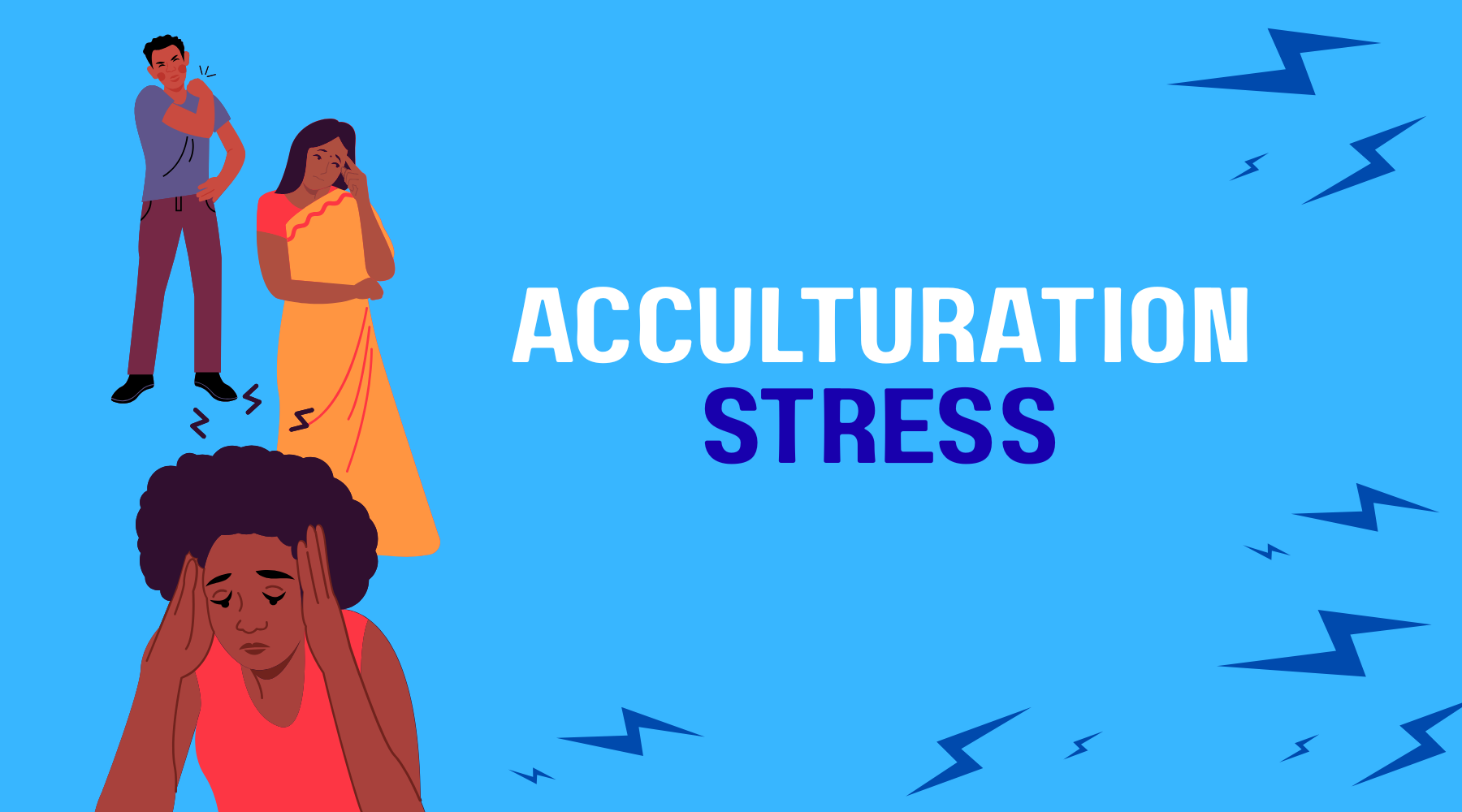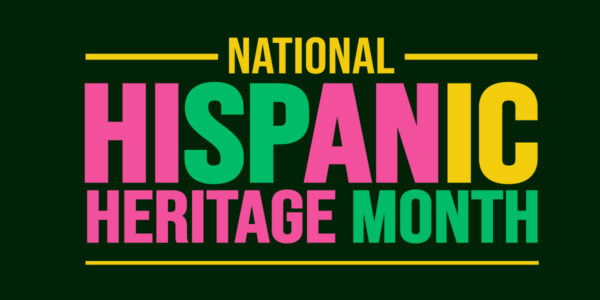By Elena Tekola
Background
As of 2023, approximately 50,234,858 documented and undocumented immigrants live in the United States(1). Acculturation, the process of adopting a host country’s culture, values, and beliefs, can be stressful for immigrants in the U.S., leading to acculturation stress. Factors that can influence acculturation stress include language barriers, discrimination, and immigration policies. Reducing acculturation stress in immigrants is important to health equity because prolonged exposure can lead to negative physical and mental health outcomes.
What is Acculturation Stress?
Acculturation stress results from trying to adapt to a host country’s culture, values, and beliefs that may be different from one’s own. Berry’s Acculturation Model proposes four types of adaptation strategies: assimilation, integration, separation, and marginalization. Assimilation is when individuals adopt the culture of the new country over their native culture. Integration is a style where individuals retain their native culture while also adopting aspects of the new culture. Separation is when individuals retain their native culture and reject the culture of the new country. Lastly, marginalization is when individuals neither retain their native culture nor adopt the culture of the new country (2). Individuals who adopt an integration style of acculturation often report lower stress (3) and are most likely to have social support (4). However, acculturation stressors (e.g., discrimination, language barriers, legal status) can discourage individuals from retaining their native culture and instead prioritize assimilation.
Acculturation Stressors
Discrimination can make the acculturation process stressful and isolating for immigrants living in the US. A survey conducted by KFF and the Los Angeles Times with over 3,000 documented and undocumented immigrant participants found that 56% of Black and 55% of Hispanic immigrants reported experiencing discrimination at work and elsewhere (5). Speaking a foreign language can sometimes be met with judgment and even hostility; in the same survey, 34% of immigrant participants answered yes to having “been criticized or insulted for speaking a language other than English” (5). Such experiences can make an individual feel pressured to assimilate. Family closeness and a reliable social network can help reduce cultural distance and challenge discriminatory barriers.
Language barriers can make the acculturation process and daily life challenging for immigrants living in the US. A study on language switching and acculturation in first-generation Chinese immigrants found that participants with limited English proficiency experienced self-doubt, embarrassment, and isolation (4). Speaking a language other than English can also make navigating healthcare services and obtaining job opportunities significantly difficult. Immigrants with limited English proficiency reported receiving fewer opportunities for promotion and being paid less than those with higher English proficiency (5). Furthermore, a study determining mental health service use in Latinx immigrants found that language proficiency was significantly associated with the utilization of mental health care (6). These findings suggest the need for strategies to support immigrants with limited English proficiency.
Restrictive immigration policies in the US not only add to the stress of acculturating but also limit access to healthcare for some immigrants. For instance, undocumented immigrants are not eligible for Medicare, Medicaid, or Affordable Care Act (ACA) health care subsidies (7). Undocumented immigrants may also be reluctant to seek health care out of fear of encountering immigration enforcement (8). Furthermore, most categories of lawfully present immigrants including refugees, people granted asylum, survivors of domestic violence and trafficking who previously qualified for ACA subsidies will no longer be eligible effective on December 31, 2025 (9). According to data extracted from the Centers for Disease Control and Prevention 2011-16 BRFSS surveys, Hispanic respondents were less likely to report having a regular healthcare provider or having had an annual checkup following an increase in Immigration and Customs Enforcement (ICE) activity in their state (10). This suggests that restrictive immigration policies can influence health-related decisions among both documented and undocumented immigrants.
Physical and Mental Health Outcomes
Negative physical health outcomes associated with acculturation stress include poor sleep quality and obesity. Acculturation stress has been linked to insomnia and poor sleep quality, as it can impact sleep by dysregulating the body’s stress response system (11). Additionally, chronic exposure to acculturation stress can lead to wear and tear on the body, which, over time, may result in surges in blood pressure and weight gain (12). Findings show that individuals experiencing negative emotions influenced by acculturation stressors are more likely to respond with unhealthy behaviors, such as overeating (13).
Acculturation stress has also been associated with depression and anxiety among both documented and undocumented immigrants. According to multiple studies, findings show that undocumented immigrants report dealing with depression, anxiety, and trauma-related distress due to acculturation stressors (14). Additionally, these stressors, combined with the challenges of having a bicultural identity, contribute significantly to the mental health of immigrant youth (15). Two studies also suggest that acculturation stress could place immigrant youth at a higher risk of developing depression and anxiety than general stress (16), (17).
Possible Solutions
Social support, expanding healthcare access, and reducing language barriers can help reduce acculturation stress in immigrants. Seeking social support to cope with acculturation stress has been found to help reduce feelings of alienation and improve self-esteem (4). Communities and organizations can increase social support by establishing wellness support groups (18), organizing events that celebrate heritage and traditions, offering English language training, providing case management, and assisting with citizenship applications. Due to recent policy changes impacting health care access for immigrants, losing health coverage may have negative effects. Local governments can improve health outcomes among immigrants by implementing programs that expand access to affordable health services (7) and reduce systemic barriers. There is also a clear need for more interpretation services to help patients with language barriers navigate health care services. Below are some organizations working to reduce language barriers and expand health care access for immigrants living in Southern Nevada:
The Immigration Foundation: The Immigration Foundation offers two psychological services to residents of North Las Vegas. These services include therapy for those experiencing symptoms of depression, anxiety, or trauma, as well as immigration mental health evaluations
Healthy Asians & Pacific Islanders (HAPI) Medical Center: HAPI is committed to meeting the healthcare needs of Asian and PI residents while removing language barriers. HAPI provides primary care services and financial assistance.
Volunteers in Medicine of Southern Nevada: VSMN provides comprehensive care to individuals without health insurance at no cost.
Asian Community Development Council (ACDC): ACDC provides state-licensed health navigators who speak different languages and can help facilitate enrollment in qualified health plans.
Family Resource Centers of Northeastern Nevada: Family Resource Centers supports residents of northeastern Nevada through case management, application assistance for the Women, Infants and Children supplemental nutrition program, and various other services. Additionally, they have bilingual staff available to help those who speak Spanish.
Community Health Alliance Nevada: CHA provides affordable, comprehensive health services and mobile health services throughout Reno and Sparks. CHA’s community health worker program assists patients by identifying patient needs, connecting patients to health services, and promoting health literacy.
Access to Healthcare Network: AHN is a non-profit organization serving uninsured Nevadans. AHN also offers non-emergency medical transportation and a membership program to help patients save on healthcare costs.
- U.S. Census Bureau. (2023). B05012: Nativity in the United States – Census Bureau table. https://data.census.gov/table/ACSDT1Y2024.B05012?q=nativity+in+nevada
- Worthy, L. D., Lavigne, T., & Romero, F. (2025, July 3). Berry’s model of acculturation. Culture and Psychology. https://open.maricopa.edu/culturepsychology/chapter/berrys-model-of-acculturation/
- Nakajima, M., Sero, A., Jama, S., Habte, S., Taha, S., Habte, H., Mekonnen, G., Geleto, I., Bongard, S., & Al’Absi, M. (2022). Acculturation Style Is Associated with Stress and Tobacco Use among East African Immigrants. Journal of Psychoactive Drugs, 55(1), 112–121. https://doi.org/10.1080/02791072.2022.2040659
- Chen, X. (2025). Dynamic stages of personality adjustment: language switching and acculturation in first-generation Chinese immigrants. BMC Psychology, 13(1). https://doi.org/10.1186/s40359-025-03222-w
- Schumacher, S., Hamel, L., Artiga, S., Pillai, D., Kirzinger, A., Kearney, A., Presiado, M., Gonzalez-Barrera, A., & Brodie, M. (2025, September 15). Understanding the U.S. immigrant experience: The 2023 KFF/LA Times Survey of Immigrants. KFF. https://www.kff.org/racial-equity-and-health-policy/kff-la-times-survey-of-immigrants/
- Premasinghe, I., Nagy, G. A., Gonzalez-Guarda, R. M., McCabe, B. E., & Stafford, A. M. (2024). Determining the role of acculturative stress in predicting mental health service use among Latinx immigrants. Ethnicity and Health, 29(6), 645–664. https://doi.org/10.1080/13557858.2024.2359393
- Nuño, L. E., Herrera, V. M., & Soto, B. S. (2022). First, do no harm: why anti-immigrant policies in the United States are a public health concern. Journal of Public Health Policy, 43(3), 403–412. https://doi.org/10.1057/s41271-022-00364-8
- De Trinidad Young, M., Tafolla, S., Saadi, A., Sudhinaraset, M., Chen, L., & Pourat, N. (2023). Beyond “Chilling effects.” Medical Care, 61(5), 306–313. https://doi.org/10.1097/mlr.0000000000001839
- National Immigration Law Center. (2025) New Law Limits Health Care & Food Aid for Immigrants – NILC. https://www.nilc.org/resources/new-law-limits-health-care-food-aid-for-immigrants/
- Friedman, A. S., & Venkataramani, A. S. (2021). Chilling effects: US immigration enforcement and health care seeking among Hispanic adults. Health Affairs, 40(7), 1056–1065. https://doi.org/10.1377/hlthaff.2020.02356
- Zhan, C., Nagy, G. A., Wu, J. Q., McCabe, B., Stafford, A. M., & Gonzalez-Guarda, R. M. (2022). Acculturation stress, age at immigration, and employment status as predictors of sleep among Latinx immigrants. Journal of Immigrant and Minority Health, 24(6), 1408–1420. https://doi.org/10.1007/s10903-022-01342-8
- D’Alonzo, K. T., Munet-Vilaro, F., Carmody, D. P., Guarnaccia, P. J., Linn, A. M., & Garsman, L. (2019). Estresse de aculturação e carga alostática entre mulheres imigrantes mexicanas. Revista Latino-Americana De Enfermagem, 27. https://doi.org/10.1590/1518-8345.2578.3135
- D’Alonzo, K. T., Johnson, S., & Fanfan, D. (2012). A biobehavioral approach to understanding obesity and the development of obesogenic illnesses among Latino immigrants in the United States. Biological Research for Nursing, 14(4), 364–374. https://doi.org/10.1177/1099800412457017
- Garcini, L. M., Daly, R., Chen, N., Mehl, J., Pham, T., Phan, T., Hansen, B., & Kothare, A. (2021). Undocumented immigrants and mental health: A systematic review of recent methodology and findings in the United States. Journal of Migration and Health, 4, 100058. https://doi.org/10.1016/j.jmh.2021.100058
- Lerias, D., Ziaian, T., Miller, E., Arthur, N., Augoustinos, M., & Pir, T. (2024). The Role of Acculturative Stress on the Mental Health of Immigrant Youth: A Scoping Literature review. Community Mental Health Journal. https://doi.org/10.1007/s10597-024-01351-x
- Katsiaficas, D., Suárez-Orozco, C., Sirin, S. R., & Gupta, T. (2013). Mediators of the relationship between acculturative stress and internalization symptoms for immigrant origin youth. Cultural Diversity & Ethnic Minority Psychology, 19(1), 27–37. https://doi.org/10.1037/a0031094
- Polanco-Roman, L., Hunter College, City University of New York, Miranda, R., & Hunter College and The Graduate Center, City University of New York. (2013). Culturally related stress, hopelessness, and vulnerability to depressive symptoms and suicidal ideation in emerging adulthood. In Behavior Therapy (Vol. 44, pp. 75–87). https://www.clinicalkey.com/service/content/pdf/watermarked/1-s2.0-S000578941200086X.pdf?locale=en_US&searchIndex=
- Immigrants rising’s wellness support groups. (2025). Immigrants Rising. https://immigrantsrising.org/supportgroups/











